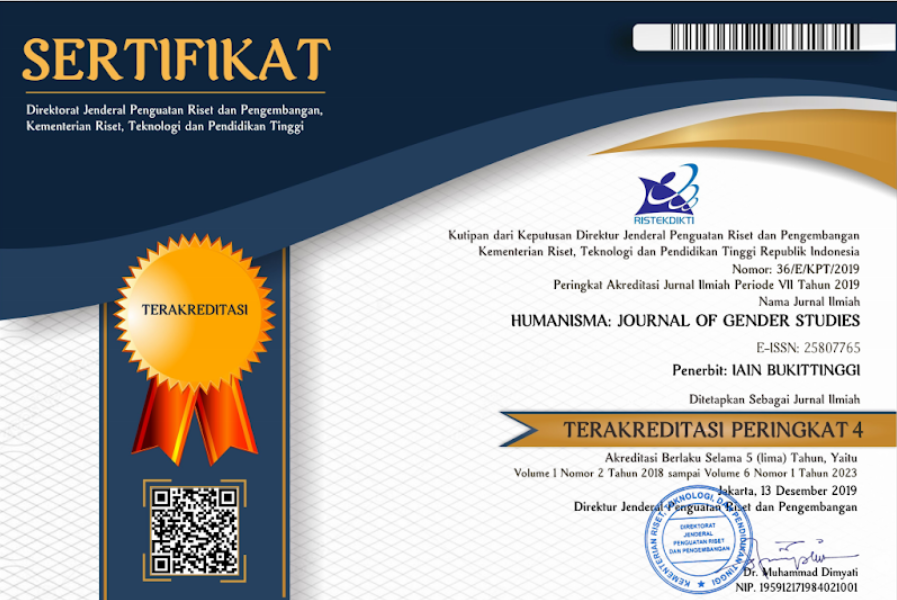Women’s Role and Position During Democratic Transition Period: A Comparison of Indonesia and Thailand
DOI:
https://doi.org/10.30983/humanisme.v6i1.5475Keywords:
Women’s Role and Position, Politics, Democratic Transition, Indonesia, Thailand, Government,Abstract
This paper observes the historical, cultural, political, and social aspects of Indonesian and Thailand women to understand the progress of the women’s role and position in the two countries, especially during the democratic transition period. This is qualitative research that utilized library sources to collect information and data through various resources such as books, documents, historical books, and webistes dated back from 1970s to 2000s in Indonesia and Thailand. Although there are similarities in development programs to address women's role and position before democratization in Indonesia and Thailand as both of them mainly focused on “practical gender interestsâ€. Interestingly, this paper reveals that during the democratic transition period, Indonesian women’s role and position in politics are one step ahead. This is due to the political stability, persistent commitment of the government to the gender equality agenda, and growing support from progressive Muslim leaders.  In contrast, political turbulence due to often military coups which result in the government’s slow performance for women’s advancement combined with less support from Buddhist leaders slowed the progress of Thailand women. This paper highlights the important role of the government policy on gender equality for women’s advancement, political stability, and the role of the majority religion (Islam in Indonesia and Theravada Buddhism in Thailand) to support women's role and position in politics.
Tulisan ini mengkaji aspek sejarah, budaya, politik, dan sosial perempuan Indonesia dan Thailand untuk memahami perkembangan peran dan posisi perempuan di kedua negara, terutama pada masa transisi demokrasi. Ini adalah penelitian kualitatif yang memanfaatkan sumber perpustakaan untuk mengumpulkan informasi dan data melalui berbagai sumber seperti buku, dokumen, buku sejarah, dan situs web dari tahun 1970-an hingga 2000-an di Indonesia dan Thailand. Meskipun ada kesamaan dalam program pembangunan untuk mengatasi peran dan posisi perempuan sebelum demokratisasi di Indonesia dan Thailand karena keduanya berfokus pada “kepentingan gender praktisâ€. Menariknya, tulisan ini mengungkapkan bahwa selama masa transisi demokrasi peran dan posisi perempuan Indonesia dalam politik selangkah lebih maju. Hal ini disebabkan oleh stabilitas politik, komitmen pemerintah yang gigih terhadap agenda kesetaraan gender dan dukungan yang semakin besar dari para pemimpin Muslim progresif. Sebaliknya, gejolak politik akibat seringnya kudeta militer yang mengakibatkan lambatnya kinerja pemerintah untuk kemajuan perempuan ditambah dengan kurangnya dukungan para pemimpin Buddhis memperlambat kemajuan perempuan Thailand. Tulisan ini menyoroti pentingnya peran kebijakan pemerintah tentang kesetaraan gender untuk kemajuan perempuan, stabilitas politik, dan peran agama mayoritas (Islam di Indonesia dan Buddhisme Theravada di Thailand) untuk mendukung peran dan posisi perempuan dalam politik.
References
Journal
Azima. “Pemberdayaan Wanita dan Tanah Adat Minangâ€, HUMANISMA Journal of Gender Studies 2, no. 2 (2018): 101-109.
Eko Wardani, Sri Budi., & Valina Singka Subekti. “Political dynasties and women candidates in Indonesia’s 2019 electionâ€, Journal of Current Southeast Asian Affairs 40, no. 1 (2021): 28-49.
Development Alternatives with Women for a New Era (DAWN). “Rethinking Social Development: DAWN’s Visionâ€, World Development 23 (1996): 11.
Dewi, Kurniawati Hastuti. “Refleksi dan Proyeksi Sepuluh Tahun (1999-2009): Affirmative Action dan Keterwakilan Perempuan di Parlemen,†Year Book P2P LIPI (2007): 27-41.
______. “Motherhood Identity in the 2019 Indonesian Presidential Elections: Populism and Political Division in the National Women’s Movementâ€, Contemporary Southeast Asia 42, no. 2 (2020): 224-250.
Hafidz ,Wardah. “Feminisme: Agenda Baru Pemikiran Islam (wawancara dengan Wardah Hafidz),†Ulumul Qur’an 6, no.3 (1995) :113.
Ka’bati. “Tradisi Matrlilineal Dalam Tjoerita Parasaian Me’salehâ€, HUMANISMA Journal of Gender Studies 4, no. 1 (2020): 1-15.
McCargo, Duncan. “Buddhism, Democracy and Identity in Thailandâ€, Democratization 11, no.4, (August 2004): 155–170. DOI: 10.1080=1351034042000234576
Nadia, Zunly. “Peran dan Aktifitas Perempuan Era Muhammad SAW (Studi atas Hadis-Hadis Riwayat Sahabat Perempuan)â€, HUMANISMA Journal of Gender Studies 4, no. 1 (2020): 16-32.
Yoshinori Nishizaki. “New Wine in an Old Bottle: Female Politicians, Family Rule, and Democratization in Thailandâ€, The Journal of Asian Studies 77, no. 2 (2018): 375–403. doi:10.1017/S002191181700136
Book
Boserup, Ester. (1970). Woman’s Role in Economic Development, George Allen and Unwin, Great Britain.
Bunbongkarn, Suchit. (1987). The Military in Thai Politics 1981-86, Institute of Southeast Asian Studies, Singapore.
_________. (1996). State of the Nation Thailand, Institute of Southeast Asian Studies, Singapore.
_________. (2004). “The Military and Democracy in Thailandâ€, in R.J.May and Viberto Selochan (eds), The Military & Democracy in Asia and The Pacific, The Australian University Press, Australia.
Blackburn, Susan. (1994). “Gender Interest and Indonesian Democracyâ€, in David Bourchier and John Legge (eds), Democracy in Indonesia 1950s and 1990s, Centre of Southeast Asian Studies Monash University, Clayton, Victoria.
_______. (2001). “Gender Relations in Indonesia: What Women Wantâ€, in Grayson Lloyd and Shannon Smith (eds), Indonesia Today: Challenges of History, Institute of Southeast Asian Studies, Singapore: 270-82.
_______. (2004). Women and State in Modern Indonesia, Cambridge University Press, Cambridge: 130–134.
Bianpoen, Calra. (2000). "The Family Welfare Movement: A Blessing or a Burden?'" in Mayling Oey-Gardiner and Carla Bianpoen (eds), Indonesian Women: the journey continues, Research School of Pacific and Asian Studies (RSPAS)
Publishing, the Australian National University, Canberra, Australia.
Dewi, Kurniawati Hastuti. (2015). Indonesian Women and Local Politics: Islam, Gender and Networks in Post-Suharto Indonesia, NUS Press & Kyoto University Press, Singapore.
Errington, Shelly. (1990). “Recasting Sex, Gender, and Power: A Theoretical and Regional Overviewâ€, in Jane Monnig Atkinson, and Shelly Errington (eds), Power and Differences: Gender in Island Southeast Asia, Stanford University Press, Stanford, California.
Fayumi, B., Thahrir, M., Farida. A, Viviani. N. (2001). Keadilan dan Kesetaraan Jender: Perspektif Islam, Departement Agama Republik Indonesia, DEPAG RI, Jakarta.
Ghosh, Chitra. (1990). The World of Thai Women, Best Books, Calcutta.
Hatley, Barbara. (1997). “Nation, “Tradition,†and Constructions of The Feminine in Modern Indonesian Literatureâ€, in Jim Schiller and Barbara martin-Schiller (eds), Imagining Indonesia: Cultural Politics & Political Culture, the Centre for International Studies, Ohio University, USA.
Jackson, Peter A. (1989). Buddhism, Legitimation, and Conflict: The Political Functions of Urban Thai Buddhism, Institute of Southeast Asian Studies, Singapore.
Kirsch, A. Thomas. (1996). “Buddhism, Sex-Roles and The Thai Economyâ€, in Penny Van Esterik (ed.), Women of Southeast Asia, Center for Southeast Asian Studies, Northern Illinois University.
Kapur-Fic, Alexander R. (1998). Thailand: Buddhism, Society, and Women, Abhinav Publications, Naraina, New Delhi.
KOWANI (Kongres Wanita Indonesia). (1978). Sejarah Setengah Abad Pergerakan Wanita Indonesia, Balai Pustaka, Jakarta.
Loos, Tamara. (2004). “The Politics of Women’s Suffrage in Thailandâ€, in Louise Edwards and Mina Roces (eds), Women’s Suffrage in Asia: Gender, Nationalism and Democracy, Routledge Curzon, London, and New York.
Limanonda, Bhassorn. (2000). “Exploring Women’s Status in Contemporary Thailand’, in Louise Edwards and Mina Roces (eds), Women in Asia: Tradition, Modernity, and Globalization, Allen & Unwin, New South Wales, Australia.
Molyneux, Maxine. (1985). “Mobilization Without Emancipation? Women’s Interests, The State, and Revolution in Nicaraguaâ€, Feminist Studies, 11
(2 ):232-33, via ProQuest Information & Learning Company, http://pcift.chadwyck.com/pcift/search?So=H&Ac=M&JID=c424&Action=SearchOrBrowse&SEARCH=Search
Moser, Caroline. (1991). “Gender Planning in The Third World: Meeting Practical and Strategic Needsâ€, in Rebecca Grant and Kathleen Newland (eds), Gender and International Relations, Open University Press, Suffolk.
Masdit, Khunying S. (1991). Politics in Thailand with Special Reference to The Role of Women, Institute of Policy Studies, Singapore.
Machali, R. (2001). “Women and The Concept of Power in Indonesiaâ€, in Susan Blackburn (ed.), Lover, Sex and Power: Women in Southeast Asia, Monash University Press, Victoria, Australia.
Mir-Hosseini, Ziba. (2003). “The Construction of Gender in Islamic Legal Thought: Strategies for Reformâ€, in Islamic Family Law and Justice for Muslim Women. ed. Nik Norianii Nik Badlisah, Sisters in Islam and the Ford Foundation, Malaysia.
Mulia, Siti Musdah. (2005). Muslimah Reformis: Perempuan Pembaru Keagamaan, Mizan, Bandung.
Nieuwenhuis, Madelon. D. (1987). “Ibuism and Priyayization: Path to Power?’, in Elsbeth Locher-Scholten and Anke Niehof (eds), Indonesian Women in Focus: Past and Present Notions, Foris Publications, The Netherlands.
Ockey, James. (2004). Making Democracy: Leadership, Class, Gender, and Political Participation in Thailand, University of Hawai’i Press, Honolulu.
Omvedt, Gail. (1986). Women in Popular Movements: India and Thailand during the Decade of Women, United Nations Research Institute for Social Development, Geneva.
Oey-Gardiner, Mayling. (2002). “And The Winner is…Indonesian Women in Public Lifeâ€, in Kathryn Robinson and Sharon Bessell (eds), Women in Indonesia: Gender, Equity, and Development, Institute of Southeast Asian Studies, Singapore.
Parawansa, Khofifah I. (2002). “Institutional Building: An Effort to Improve Indonesian Women’s Role and Statusâ€, in Kathryn Robinson and Sharon Bessell (eds), Women in Indonesia: Gender, Equity, and Development, Institute of Southeast Asian Studies, Singapore.
Phongpaichit, Pasuk and Baker, Chris. (2004). Thaksin: The Business of Politics in Thailand, Silkworm Books, Thailand.
Pongsapich, Amara. (1988). Occasional Papers on Women in Thailand, Women’s Studies Program, Chulalongkorn University Social Research Institute, Bangkok, Thailand.
Rahman, Sinta Nuriyah., et.al. (2005). Kembang Setaman Perkawinan: Analisis Kiritis Kitab ‘Uqud Al-Lujjayn, Kompas, Jakarta.
Reid, Anthony. (1988). “Females Roles in Pre-Colonial Southeast Asiaâ€, Modern Asian Studies 22 (3): 629-645.
Robinson, Kathryn. (2000). “Indonesian Women—from Order Baru to Reformasiâ€, in Kathryn Robinson and Sharon Bessell (eds), Women in Indonesia: Gender, Equity, and Development, Institute of Southeast Asian Studies, Singapore.
_______. (2001). “Gender, Islam and Culture in Indonesiaâ€, in Susan Blackburn (ed.), Lover, Sex and Power: Women in Southeast Asia, Monash University Press, Victoria, Australia.
Rogers, Barbara. (1980). The Domestication of Women: Discrimination in Developing Societies, Routledge, London, and New York.
Suksamran, Somboon. (1993). “Buddhism, Political Authority, and Legitimacy in Thailand and Cambodiaâ€, in Trevor Ling (ed.), Buddhist Trends in Southeast Asia, Institute of Southeast Asian Studies, Singapore, 1993.
Schwarz, Adam. (2004). A Nation in Waiting: Indonesia’s Search for Stability, Talisman, Genting Lane, Singapore.
Suryakusuma, Julia I. (1996). “The State and Sexuality in New Order Indonesiaâ€, in Laurie J. Sears (ed.), Fantasizing the Feminine in Indonesia, Duke University Press, Durham, and London.
Sullivan, Norma. (1991). “Gender and Politics in Indonesiaâ€, in Maila Stivens (ed.), Why Gender Matters in Southeast Asian Politics, Centre of Southeast Asian Studies, Monash University, Aristoc Press, Australia.
_______. (1994). Masters and Managers: A Study of Gender Relations in Urban Java, Allen & Unwin, New South Wales, Australia.
Subhan, Zaitunah. (2002). Rekonstruksi Pemahaman Jender Dalam Islam: Agenda Sosio-Kultural dan Politik Peran Perempuan, El-Kahfi, Jakarta.
Soonthorndhada, Amara. (1992). “Adolescent Role Behavior, Expectations and Adaptations: Past and Presentâ€, in Bencha Yoddumnern-Attig, Kerry Richter, Amara Soonthorndhada, Chanya Sethaput, Anthony Pramualratana, Changing Roles and Statuses of Women in Thailand: A Documentary Assessment, the Institute for Population and Social Research, Mahidol University, Salaya, Thailand.
Thitsa, Khin. (1980). Providence and Prostitution: Image and Reality for Women in Buddhist Thailand, Calvert’s North Star Press, London.
Tantiwiramanond, Darunee., and Pandey, Shashi Ranjan. (1991). By Women, For Women: A Study of Women’s Organizations in Thailand, Institute of Southeast Asian Studies, Singapore.
Tantiwiramanond, Darunee., and Pandey, Shashi Ranjan. (1997). “New Opportunities or New Inequalities: Development Issues and Women’s Lives in Thailandâ€, in Virada Somswasdi and Sally Theobald (eds), Women, Gender Relations and Development in Thai Society, Women’s Studies Center Faculty of Social Science Chiang Mai University, Thailand.
Tinker, Irene. (1990). Persistent Inequalities: Women and World Development, Oxford University Press, New York.
Umar, Nasaruddin. (2001). Argumen Kesetaraan Jender: Perspektif Al-Qur’an (Gender Equality: Al-Qur’an Perspective), PARAMADINA Publisher, Jakarta.
Van Esterik, Penny. (2000). Materializing Thailand, Berg, Oxford, New York.
Vichit-Vadakan, Juree. (1993). “Women in Politics in Thailandâ€, in Yogesh Atal (ed.), Women in Politics: Australia, India, Malaysia, Philippines, Thailand, UNESCO Principal Regional Office for Asia and the Pacific, Bangkok.
Ward, Barbara. (1963). Women in the New Asia: The Changing Social Roles of Men and Women in South and South-East Asia, Netherlands: Unesco.
Yoddumnern-Attig, Bencha. (1992). “Thai Family Structure and Organization: Changing Roles and Duties in Historical Perspectiveâ€, in Bencha Yoddumnern-Attig, Kerry Richter, Amara Soonthorndhada, Chanya Sethaput, Anthony Pramualratana, Changing Roles and Statuses of Women in Thailand: A Documentary Assessment, the Institute for Population and Social Research, Mahidol University, Salaya, Thailand.
Yoddumnern-Attig, Bencha. (1992). “Conjugal and Parental Roles: A Behavioral Look into the Past and Presentâ€,
in Bencha Yoddumnern-Attig, Kerry Richter, Amara Soonthorndhada, Chanya Sethaput, Anthony Pramualratana, Changing Roles and Statuses of Women in Thailand: A Documentary Assessment, the Institute for Population and Social Research, Mahidol University, Salaya, Thailand.
Young, Kate. (2000). “Gender and Developmentâ€, in Nalini Visvanathan, et. al (eds), The Women, Gender and Development Reader, Zed Books, London, and New Jersey.
Other
DBpedia. (2022). “About: bilateral descentâ€, https://dbpedia.org/page/Bilateral_descent, 14 May 2022 l(accessed 14 May 2022)
IPU (Inter-Parliamentary Unions). (2005). http://archive.ipu.org/wmn-e/arc/classif280205.htm
IPU (Inter-Parliamentary Unions). (2022). “Monthly ranking of women in national parliaments.â€, https://data.ipu.org/women-ranking?month=3&year=2022 (accessed 15 March 2022)
ILO. (2005). “National Guidelines in Thailand - National Commission on Women’s Affairsâ€, http://www.ilo.org/public/english/employment/gems/eeo/guide/htm
JIL. (2005). “About Liberal Islam Network,†http://islamlib.com/en/aboutus.php
“Kompilasi Hukum Islam Sangat Konservatif,â€. (2005). JIL official website http://islamlib.com/id/index.php?page=article&id=408
Kompas, March 8. (2005). “Buka Kembali Bahasan Naskah Tandingan Kompilasi Hukum Islamâ€.
Kompas Cyber Media, July 25. (2000). “Potensi Perempuan Dimarginalkan Orde Baruâ€, http://www.kompas.com
Munir, Lili Zakiyah. (2005). “Lily Munir on Indonesian Islamic Liberation Theology.†An interview with Yoginder Sikand, May 24, http://www.muslimwakeup.com/main/archives/2005/05/lily_munir_on_i.php (accessed 15 September 2006).
Sirivunnabood, Punchada. (2019). “Women MPs in the 2019 Thai Parliamentâ€, https://www.iseas.edu.sg/media/commentaries/women-mps-in-the-2019-thai-parliament-by-punchada-sirivunnabood/, 3 June 2019 (accessed 7 April 2022)
Thailand: Organic Act on Political Parties B.E. 2550 [2007] https://aceproject.org/ero-en/regions/asia/TH/thailand-organic-act-on-political-parties-b.e./view (accessed 15 May 2022)
The Organic Act on the Election Commission, B.E. 2550 (2007) http://thailaws.com/law/t_laws/tlaw0377.pdf (accessed 15 May 2022).
“The result of Thailand General Election in 2005â€. (2005). http://www.thaiembdc.org/pressctr/pr/pr4148.pdf
Ward, Oliver. “A Man’s World: Military Rule in Thailand Has Strangled Female Representation in Politicsâ€, ASEAN Today, 21 June 2019, https://www.aseantoday.com/2019/06/a-mans-world-military-rule-in-thailand-has-strangled-female-representation-in-politics/ (accessed 15 May 2022)
Yingluck Shinawatra Prime Minister of Thailand, https://www.britannica.com/biography/Yingluck-Shinawatra, (accessed 15 March 2022)
Downloads
Submitted
Accepted
Published
Issue
Section
License
Authors who publish with this journal agree to the following terms:
- Authors retain copyright and grant the journal right of first publication with the work simultaneously licensed under a Creative Commons Attribution-ShareAlike 4.0. that allows others to share the work with an acknowledgment of the work's authorship and initial publication in this journal.
- Authors are able to enter into separate, additional contractual arrangements for the non-exclusive distribution of the journal's published version of the work (e.g., post it to an institutional repository or publish it in a book), with an acknowledgment of its initial publication in this journal.
- Authors are permitted and encouraged to post their work online (e.g., in institutional repositories or on their website) prior to and during the submission process, as it can lead to productive exchanges, as well as earlier and greater citation of published work (See The Effect of Open Access).



















